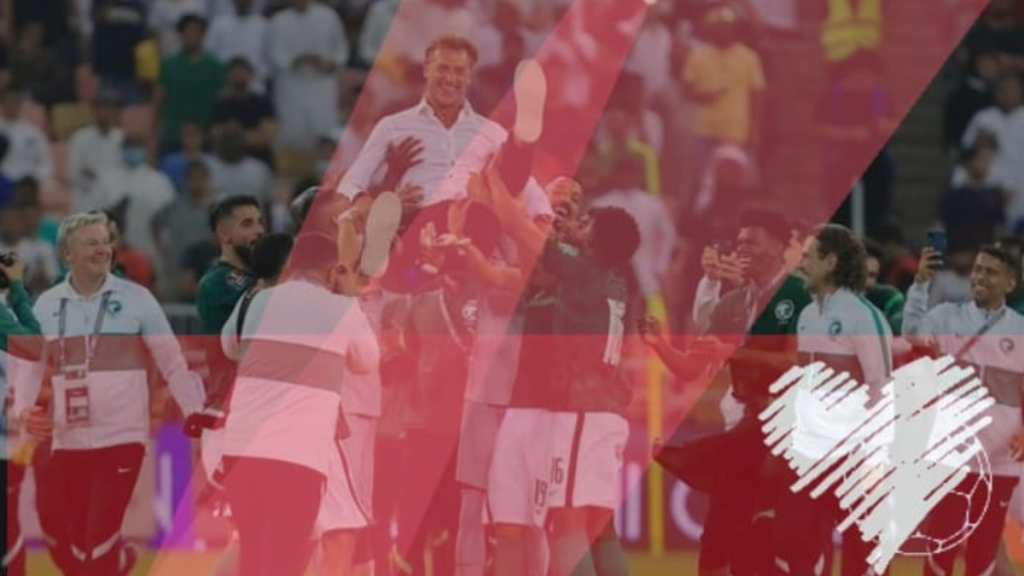If like most people you are still rubbing your eyes wondering if Saudi Arabia really did pull off one of the greatest World Cup shocks of all time, let us assure: yes, it DID happen. After an early Lionel Messi goal set the tone for what seemed to be a routine heavy win for the South American champions, there were no fewer than three marginal – but correct – VAR decisions that reprieved their Asian opponents before half time. After the break, two beautifully taken goals inside the first 10 minutes put the Saudis in front, and so it remained.
There are few ways to quantify the stunning 2-1 win Herve Renard’s side that make much sense to a logical mind, so we have turned to The Asian Game Senior Contributor Martin Lowe to unpack how exactly the Saudis engineered such a seismic result.
Has a result like this been coming for Saudi Arabia, or has it come as much of a shock as it has to the rest of the world?
Saudi football, like many nations around the world, has tended to be reactive; chopping and changing coaches every given year, with no real long-term plan or idea of how they would like to succeed on the world stage moving forward.
That changed in 2017 when they qualified for their first World Cup in 12 years, under Bert van Marwijk. He qualified them using a style of play historically adjoined with Saudi football; reactive, physical, emotional and effective in moments, while remaining solid for large parts.
While van Marwijk swiftly exited (due to a row over whether he should or shouldn’t move to the Middle East full time), his successor would build from the ground up a new way of playing moving forward. Juan Antonio Pizzi came in and instantly switched the way the team played, to focus on possession (tiki-taka); slow, methodical, and technical.
He was embraced by the Saudi FF, who bred his philosophy down the youth pyramid, and backed his ideals in getting players into Europe. Eight players moved to Spain in January 2018 to spend 6 months on loan with various La Liga clubs.
Short term, his tenure was a spectacular disaster. Thumped by Russia in the World Cup (with some redemption in the other two matches), followed by a pretty average Asian Cup the January after. The players that headed off to Spain barely saw pitch time and came back with their tail between their legs.
It was a case of too quick, too soon. The older generation couldn’t cope with a complete overhaul in style; the players heading to Spain needed more time to adjust to a completely different way of playing.

Herve Renard, in many ways, has succeeded in the difficult bedding in work of Pizzi. Rather than jumping two feet into that approach, he’s used it when needed and been more pragmatic in his use of old school Saudi physicality and savviness. It wasn’t a flawless qualification cycle, but with every given match the team grew.
Similarly, so did the next generation. Finalists in 2020, champions earlier this summer, their under-23 side were growing in Pizzi’s model under Saad Al-Shehri, a coach who has kept a close relationship with both coaches over their tenure. That symmetry from youth football to seniors has borne fruit against Argentina today; Hassan Tambakti, Firas Al-Buraikan and Saud Abdulhamid were all part of the under-23 team that only a few months ago won Asian Youth Cup gold.
In answer to your question, yes you can directly link back decisions made years ago to today’s success. But this is only part of the way along what looks to be a promising long-term plan.
How did Herve Renard pull this off? His side seemed to be set up very ambitiously.
His set up was perfect. Heading into a match no-one had high hopes of, he set up positively and aimed to squeeze the centre of the pitch. In preparation, he’d used a high line before (against Panama & Croatia) to varying levels of success, but they got away with it against Argentina, given their solidity.
It’s difficult to suggest this was honed in qualification, as they rarely faced such a quality team, but they have always sought to take control of every match they’ve played in.
What did Saudi Arabia do differently to Qatar in their lengthy preparations for this tournament, given how wildly contrasting their opening performances were?
Qatar were in camp for six months, Saudi Arabia just two; crucially in that regard the squad tasted competitive football in the Saudi Pro League (8-9 matches) following the summer break.
The Saudi league is head and shoulders the best league in West Asia, mixing both a rich talent pool of local talent, quality foreigners and a highly competitive arena. Playing in front of raucous Saudi atmospheres week in week out helps the mentality also!
Qatar doesn’t have any of that, and in a way needed to bed down earlier merely to avoid injury to their key players. While Saudi would’ve been lost without a few essential individuals, they had plenty of options in reserve; Qatar haven’t.
The other key difference as mentioned above; this Saudi team is growing towards its peak and has young players coming through contesting for starting positions. Qatar peaked in 2019 and have very little coming through. While Saudi Arabia are flourishing, Qatar have stagnated.
How much can we read into this performance with regards to this tournament, and for Saudi Arabia’s standing further down the line? Will this earn more respect for Asian football?
In West Asia, Saudi Arabia hold significant respect. Many of these players have won it all at club level; many of whom are with Asian juggernauts Al-Hilal, and will have aims to succeed at next year’s Asian Cup. That said, the East (& Australia) will still not fully respect them individually until they move to Europe. It’s to be seen whether this World Cup opens that channel.
In terms of this tournament, I thought it had arrived too soon, and worried the group draw was too difficult, but Renard’s found something that works. All bets seem to be off now for them to contest for progression to the knockout stages.


Leave a comment